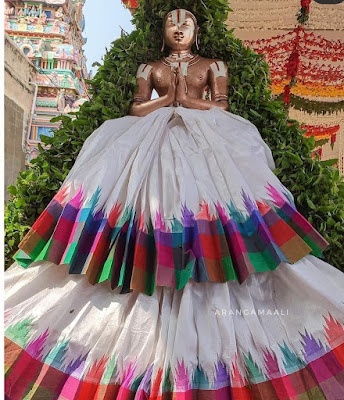ANADHYAYANA KALAM - TIRUKAARTI AND
'adhyayanam' means study/recitation.
'an-adhyayanam' means suspension of studies/recitation (divya prabandham)
The time period starting from kArtigai month - kArtigai nakshatra to tai month - hasta nakshatra is called 'anadhyayana kAlam or tirukArti'. AzhvArs' divya prabandhams are not recited during this period at homes. But there are some exceptions as follows.
*DOS AND DON'TS AT HOMES DURING ANADHYAYANA KALAM*
1. Divya Prabandhams are not recited in homes from the evening of kArtigai month, kArtigai nakshatram which is tirumangai AzhvAr's tirunakshatram and also the tirurkArtigai festival day.
2. But all AzhvArs' taniyans can be recited and also learnt during this period.
3. In Margazhi/dhanur mAsam, only tirupaLLiyezhuchchi and tiruppAvai can be recited in the early hours of morning, but not taught or learnt.
4. This tirukArti period can be used to learn other stOtras and prabandhams of Swami rAmAnuja, swAmi Desikan, swAmi maNavALamAmunigaL and other AchAryas.
5. From tai hastam, all temples and homes can resume divya prabandham recitation after starting with tirupallANDu.
*TIRU ADHYAYANA UTSAVAM - 21 days*
 |
| Srirangam Namperumal handsover tirumugapaTTaiyam to NammAzhvAr on TirukkArtigai |
In this period of restriction called anadhyayana kAlam, 21 special days are earmarked for recitation of all the 4000 divya prabandhams. This event is called 'tiru adhyayana utsavam'.
In Srirangam, on the evening of tirukkArtigai, after sokkapAnai is lit, NamperumAL comes to sandana manDapam and gives the 'TirumugapaTTayam" (paTTOlai - silk scroll), peetagavADai (peetAmbaram - silk robe) and sandanam (sandal paste) to NammAzhvAr and invites him to recite Divya Prabandham for 21 days. ( In olden days, NammAzhvAr and other AzhvAr's vigraham were brought from AzhvAr Tirunagari to Srirangam. The prabandha gOshti also travelled to Srirangam. As this would take around 45 days time, divya prabandha pArAyaNam at homes was suspended.)
HOW THE ADHYAYANA UTSAVAM STARTED?
*IRAA PATTU - 10 DAYS*
Tirumangai AzhvAr started the tradition of reciting tiruvAymozhi pAsurams during the ten days starting from VaikunTha EkAdashi, in the evenings. This 10 day utsavam is called 'irApattu' or 'tiruvAymozhi tirunAL'.
*PAGAL PATTU - 10 DAYS*
Many years later, there was an addition of 10 days before VaikunTha EkAdashi for recitation of mudal Ayiram, iyarpA and periya tirumozhi pAsurams, in the mornings. This 10 day utsavam is called 'pagal pattu' or 'tirumozhi tirunAL'.
*TIRUNEDUNDANTAKAM TIRUNAL - 1 DAY*
After tirumangai AzhvAr composed tiruneDuntAnDakam, the pleased NamperumAL asked AzhvAr what boon he wanted. AzhvAr requested that
1) Divya Prabandhams be given an equal status to vedas in the temple and should be recited daily. (drAviDa vEdam)
2) PerumAl and PirATTi should listen to tiruvAymozhi recitation.
The divine couple agreed. To mark this special event, one day prior to pagal pattu, tiruneDuntANDakam prabandham is recited.
Another significance of TiruneDuntANDakam tirunAL is the celebration of victory of Shri ParAsara BhaTTar who won a debate with an advaitin scholar using tiruneDuntANDakam verses.
So, tiruneDuntANDakam, pagal pattu and irApattu together totals to 21 days of adhyayana utsavam in Srirangam temple.
NAMMAZHVAR TIRUVADI TOZHAL
The utsavam concludes with 'sARRumurai' and 'nammAzhvAr tiruvaDi tozhal', where the scene of swAmi nammAzhvAr attaining mOksham at Lord RanganAtha's feet is enacted.
*ARAIYAR SEVAI*
'araiyar sEvai' is a significant part of tiru adhyayana utsavam in Srirangam. Temple priests called 'araiyars' (kings of music) belong to the descendant families of swAmi Nathamuni. Every day, they enact the meaning of divya prabhandhams through their serene performance that includes dEvagAnam (musical form of pAsurams), abhinayam (dance gestures) and a traditional vyAkhyAnam called 'tambirAn paDi'.
This beautiful and divine utsavam is conducted in many other divya dEsams with slight variations.
All other devotees at home have to wait till 'tai hastam' ( koorattAzhvAn tirunakshatram) to resume Divya Prabandham recitation.
TIRU ADHYAYANA UTSAVAM INVITATION
AZHVAR TIRUVADIGALE SHARANAM








No comments:
Post a Comment